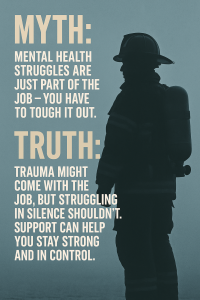Mental Health MythBusters Monday: Debunking Misconceptions in First Responder Wellness

Every Monday, “Mental Health MythBusters” takes aim at the misinformation that too often clouds our understanding of first responder wellness. In high-stress professions—firefighting, law enforcement, EMS—mental health isn’t an afterthought; it’s mission-critical. Today we’re shining a spotlight on three pervasive myths, showing you the reality behind them, and explaining how Connect & Protect’s anonymous, AI-assisted peer support is setting a new standard in evidence-based care.
1. Myth vs. Reality
Myth #1: “First responders are tough—mental health support isn’t necessary.”
Reality: Physical toughness doesn’t immunize anyone against stress, burnout, or PTSD. Studies show first responders experience higher rates of anxiety and depression than the general population.
Myth #2: “Talking about mental health means you’re weak.”
Reality: Open conversation is a proven resilience-builder. Peer-reviewed research finds that teams who discuss stress openly report lower turnover and fewer critical incidents.
Myth #3: “Anonymous support can’t be as effective as in-person therapy.”
Reality: Anonymity removes stigma barriers and dramatically boosts help-seeking behavior. When combined with AI-driven peer matching and evidence-based tools, anonymous support can rival—and sometimes surpass—traditional interventions.
2. How Anonymous, AI-Assisted Peer Support Improves Outcomes
• Immediate access: 24/7 chat connects first responders with peers who’ve “walked in their boots.”
• Intelligent matching: AI analyzes preferences and experiences to pair members with the most relevant peer supporters.
• Data-driven insights: Aggregate, anonymous data helps organizations spot trends and tailor wellness programs before crises escalate.
• Confidential environment: Knowing their identity is protected, members are more likely to share honestly and follow through on recommendations.
3. Practical Tips to Challenge Outdated Beliefs
• Lead by example: Encourage supervisors and veteran responders to share personal experiences with stress and recovery.
• Demystify the process: Host short, monthly workshops that explain how anonymous peer support works and why it’s effective.
• Celebrate small wins: Recognize individuals who take proactive steps—like joining a Connect & Protect group or completing a self-care module.
Connect & Protect is more than a platform—it’s a movement toward a healthier, more resilient first responder community. By combining the power of anonymity, AI, and evidence-based peer support, we’re breaking down walls, busting myths, and saving lives—one mind at a time.
Ready to see it in action? Book a demo today (Click Here) and discover how Connect & Protect can transform wellness in your department.
